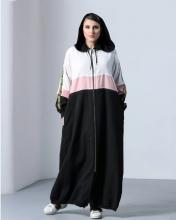In recent years, the fashion industry has witnessed a remarkable evolution in catering to the diverse needs and preferences of women. An innovative and noteworthy addition to this revolution is the emergence of sports abaya. Combining elegance and practicality, these unique garments allow Muslim women to participate in sports activities while maintaining their modesty and cultural identity. In this article, we will explore the concept of sports abayas, their significance, and the positive impact they have had on women's participation in sports.
The Rise of Sports Abayas Traditional abayas are loose-fitting garments worn by Muslim women to cover their bodies as per Islamic customs. However, the design of traditional abayas is not conducive to physical activities, particularly sports. Recognizing this limitation, fashion designers and entrepreneurs began conceptualizing sports abayas to address the growing demand for modest sportswear options. Sports abayas feature lightweight, breathable fabrics that facilitate ease of movement, while still adhering to the principles of modest dressing. Embracing Athleticism and Cultural Identity Sports abayas play a vital role in empowering Muslim women to actively engage in sports and lead an active lifestyle. These specially designed garments provide the necessary coverage, allowing women to participate comfortably in various sports without compromising their cultural and religious beliefs. By combining functionality with cultural modesty, sports abayas encourage Muslim women to embrace their athletic side, fostering a sense of confidence and inclusivity within the sports community. Breaking Stereotypes and Challenging Misconceptions One of the significant impacts of sports abayas is their ability to challenge stereotypes surrounding Muslim women and sports. Through their participation in sports while wearing abayas, Muslim women are redefining societal norms and shattering misconceptions. They demonstrate that athleticism knows no boundaries and that women can excel in sports regardless of their cultural or religious background. This shift in perception not only promotes inclusivity but also encourages other women to embrace their passions and overcome societal barriers. Conclusion Sports abayas symbolize the harmonious blend of fashion, culture, and sports. They enable Muslim women to actively participate in physical activities while maintaining their modesty and cultural identity. By providing a practical and stylish alternative to traditional abayas, sports abayas have revolutionized the way Muslim women engage in sports. These garments have not only empowered women to embrace athleticism but also challenged stereotypes and fostered inclusivity within the sports community. As the demand for sports abayas continues to grow, it is evident that they have become a symbol of empowerment and a testament to the resilience and determination of Muslim women in pursuing their passions.Sports Abaya: Embracing Athleticism with Modesty
Sports Abaya: Embracing Athleticism with Modesty
